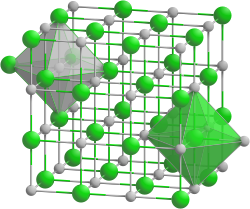Hafnium carbide
| Crystal structure | ||||||||||||||||
|---|---|---|---|---|---|---|---|---|---|---|---|---|---|---|---|---|

|
||||||||||||||||
| __ Hf 4+ __ C 4− | ||||||||||||||||
| General | ||||||||||||||||
| Surname | Hafnium carbide | |||||||||||||||
| other names |
|
|||||||||||||||
| Ratio formula | HfC | |||||||||||||||
| Brief description |
gray powder |
|||||||||||||||
| External identifiers / databases | ||||||||||||||||
|
||||||||||||||||
| properties | ||||||||||||||||
| Molar mass | 190.5 g mol −1 | |||||||||||||||
| Physical state |
firmly |
|||||||||||||||
| density |
12.2 g cm −3 |
|||||||||||||||
| Melting point |
3890 ° C |
|||||||||||||||
| solubility |
almost insoluble in water |
|||||||||||||||
| safety instructions | ||||||||||||||||
|
||||||||||||||||
| MAK |
0.5 mg m −3 (based on Hf) |
|||||||||||||||
| As far as possible and customary, SI units are used. Unless otherwise noted, the data given apply to standard conditions . | ||||||||||||||||
Hafnium carbide (outdated: hafnium carbide ) is an intermetallic compound of the elements hafnium and carbon with the formula HfC, which is characterized by its extraordinary thermal and mechanical resistance.
Extraction and presentation
Hafnium carbide can be prepared using the same methods as titanium carbide . It can be done by carbothermal reduction of hafnium dioxide
or by synthesis from the elements at more than 2000 ° C. Since hafnium carbide is very sensitive to nitrogen , very pure argon must be used for high sintering .
It can also be made from hafnium (IV) chloride .
Production by plasma CVD is also possible.
properties
Hafnium carbide is a solid solution in which the carbon the octahedral gaps fills within the Hafniumkristalls. With a melting point of around 3890 ° C, the substance has the highest temperature resistance of any known two-component element and can therefore be used as a refractory material (it is not yet certain whether hafnium carbide or tantalum carbide has the higher melting point). Its high hardness is also typical of metal-like carbides . The density is 12.2 g cm −3 .
Hafnium carbide has a crystal structure of the sodium chloride type with a considerable phase width (HfC 0.99 -HfC 0.60 ) and a Vickers hardness of 26.1 GPa and a modulus of elasticity of 350-510 GPa. It oxidizes in air from 500 ° C. Like titanium carbide , it forms solid solutions with oxygen and nitrogen .
The temperature resistance of tantalum hafnium carbide is even higher .
use
The technical use is limited by the relatively high price of the material. However, whiskers and coatings are produced from this material. It is also used in control rods of nuclear reactors.
Individual evidence
- ↑ a b c d e data sheet hafnium carbide from AlfaAesar, accessed on February 9, 2010 ( PDF )(JavaScript required) .
- ↑ Data sheet Hafnium (IV) carbide from Sigma-Aldrich , accessed on April 3, 2011 ( PDF ).
- ↑ a b c Georg Brauer (ed.), With the collaboration of Marianne Baudler a . a .: Handbook of Preparative Inorganic Chemistry. 3rd, revised edition. Volume II, Ferdinand Enke, Stuttgart 1978, ISBN 3-432-87813-3 , p. 1387.
- ^ A b c Hugh O. Pierson: Handbook of Refractory Carbides & Nitrides: Properties, Characteristics ... William Andrew, 1996, ISBN 0-08-094629-1 , pp. 76 ff . ( limited preview in Google Book search).
- ^ Dale L. Perry: Handbook of Inorganic Compounds, Second Edition . Taylor & Francis US, 2011, ISBN 1-4398-1462-7 , pp. 193 ( limited preview in Google Book search).


